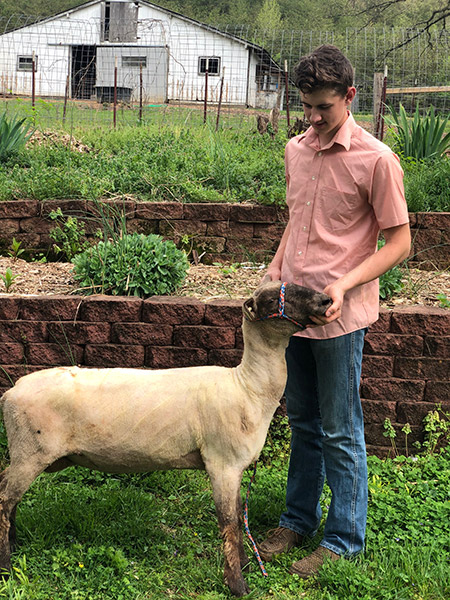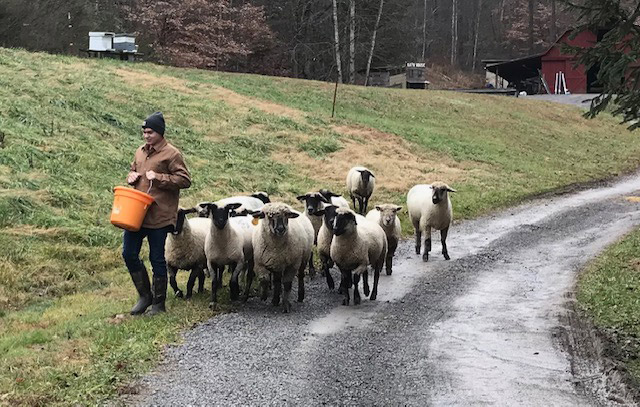4-H members carry on ranching tradition
A new generation of farmers is cropping up in Anderson County.
Bristol Brown, Nicholas Monday and Avery Chandler are all 4-H members and are actively raising, showing and selling livestock. They breed them and often sell them to other 4-Hers.
“There’s a lot involved in a breeding project,” said Donna Carter, who oversees the 4-H program in Anderson County. “Youth have to start with quality females, then select their sire, have the female bred — often learning to artificially inseminate — ultrasound the females to determine whether they are pregnant, feed and care for a pregnant animal, assist during the farrowing/lambing process, and then appropriately care for the offspring. It’s been really awesome to see how big their farming operations have gotten and discovering what they are using their profits for.”
Bristol Brown is a seventh-grader at His Hands Reaching Academy. He started 4-H in the fourth grade. He and his sister, Baylee, work together at B & B livestock, a 200-acre farm owned by his family. They raise market hogs, sheep, short horn cattle, chickens, and “all that good stuff,” according to their mother, Breeanna Brown.
“They learned how to artificially inseminate pigs this year,” she said. “They’re responsible for training their animals for show.”
A typical day involves clipping and washing the sheep, training them during show season and all other aspects of caring for them. It usually takes one hour and a half to two hours a day, but sometimes much longer.
“Most of their summer is spent at the barn,” she said. “But if they had to pick anywhere to be, that’s where they would be.”
Bristol said that the sheep are his favorite animal to work with.
“They’re a little more competitive,” he said. “It’s a lot of work and a lot of training.”
Nicholas Monday is an 11th-grader who also started 4-H in fourth grade. He started with pigs but started to show sheep in the 9th grade, according to his mother, Alieshia Monday.
“He’s taken some to market and showed at all the fairs last year,” she said. “He’s made some pretty good money.”
Nicholas keeps records of all his sheep, including who they are bred to, when their birthing dates are and after they have had lambs. He gives them shots, weighs them and makes sure everybody is healthy.
He currently has 24 lambs.
“He’s raised 19 of those and brought a couple more to show,” Alieshia said.
He also has two rams and 19 ewes.
A year and a half ago, they only had two sheep.
“He buys them and puts all his money back into them,” she said.
His family has no background in livestock.
“It’s all him,” she added.
Nicholas originally planned to become a neurosurgeon, but now he hopes to become a vet. He wants to continue raising sheep as well.
Avery Chandler is a homeschooled 11th-grader. He got into 4-H later than most kids, according to his mother, Lori Chandler, but once he started he dove in.
Avery is one of 10 children, and most of his siblings are avid 4-Hers as well. He got started when he was working at a neighbor’s farm one summer, and that farmer’s daughter was raising pigs and sheep.
“He got in on the pig project that first year, training and grooming them,” Lori said. “Then he decided he wanted to do that.”
Avery is president of the honor club in 4H and has a lot of ambition. He just got back from the All Star retreat in Greeneville, Tennessee, and did a little bit of everything, according to Lori.
“But he’s devoted to sheep,” she said.
Former School Superintendent Larry Foster, a nearby neighbor, helped Avery when it came to raising sheep because the family had no experience. All three boys credit former Anderson County Ag Extension Agent Joe Hall for mentoring them and teaching them about the ins and outs of raising sheep. It’s through the experience of longtime farmers that they are able to carry on the tradition.
“I did this essay where I interviewed Joe, and a few days later he called me and brought me two bottle babies, and that’s how I started,” Avery said. “That got me sheep fever. I decided I liked it. I originally didn’t want sheep, but after I got them, I changed my mind.”
Why didn’t he originally want sheep?
“Because they’re dumb,” he laughed. “Mine are sweet, but they’re not very intelligent.”




